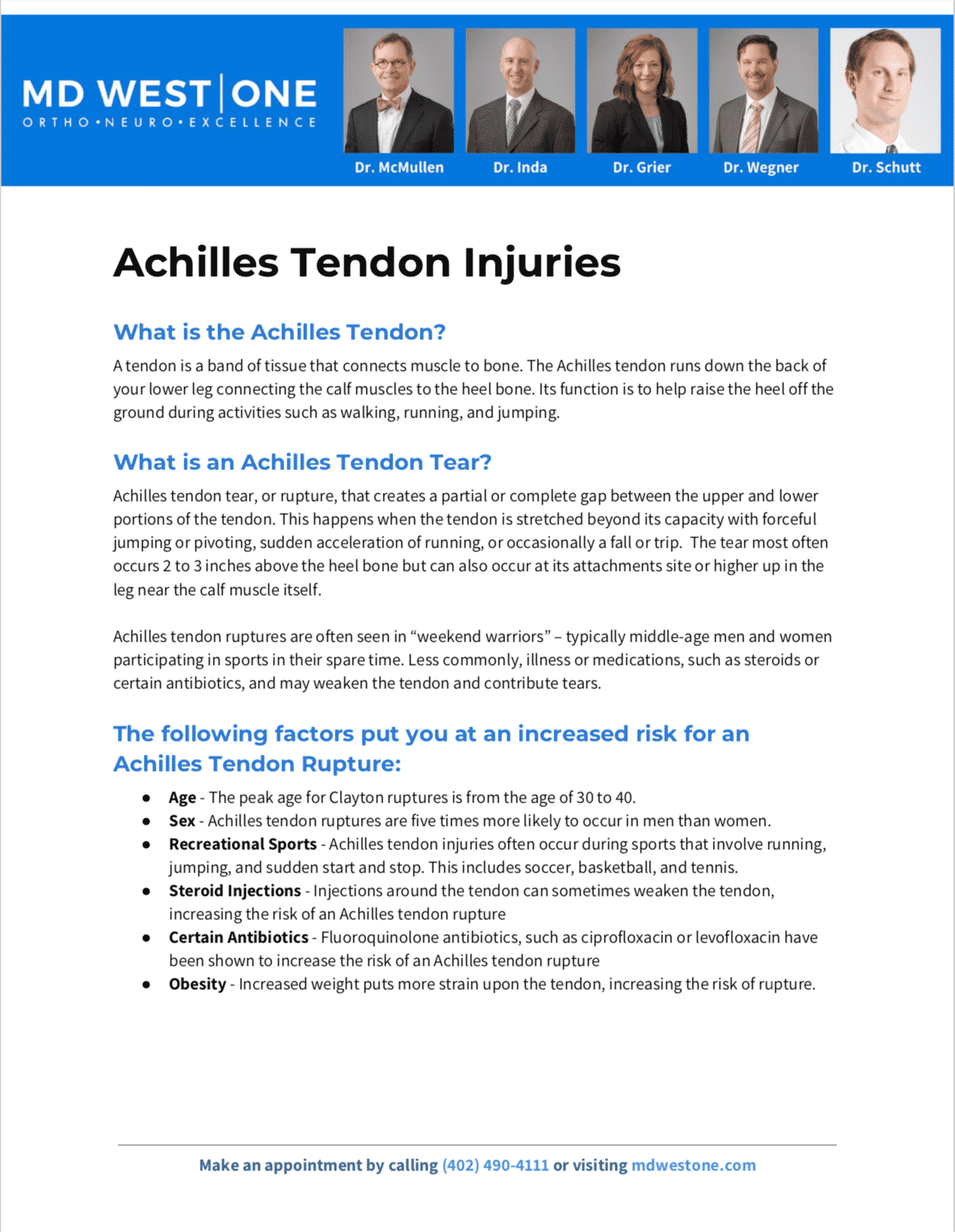Are you suffering from a potential Achilles tendon injury?
The Omaha Foot & Ankle Specialists at MD West ONE are able to properly diagnose and treat Achilles tendon injuries through both surgical and non-surgical treatments. If you have the following symptoms, you may want to make an appointment with one of our Board Certified Specialists.
- Sudden pain in the back of your ankle
- A popping or snapping sound at the time of your injury
- Swelling and bruising on the back of your leg, extending down to your heel
- The feeling of being kicked in the calf
- Difficulty walking and difficulty rising up on your toes
Meet MD West ONE's foot and ankle specialists and learn more about how they treat Achilles tendon injury.
Achilles Tendon Rupture Causes, Treatments & Surgery
What is the Achilles Tendon?
A tendon is a band of tissue that connects muscle to bone. The Achilles tendon runs down the back of your lower leg connecting the calf muscles to the heel bone. Its function is to help raise the heel off the ground during activities such as walking, running, and jumping.
What is an Achilles Tendon Tear?
Achilles tendon tear, or rupture, that creates a partial or complete gap between the upper and lower portions of the tendon. This happens when the tendon is stretched beyond its capacity with forceful jumping or pivoting, sudden acceleration of running, or occasionally a fall or trip. The tear most often occurs 2 to 3 inches above the heel bone but can also occur at its attachments site or higher up in the leg near the calf muscle itself.
Achilles tendon ruptures are often seen in “weekend warriors” – typically middle-age men and women participating in sports in their spare time. Less commonly, illness or medications, such as steroids or certain antibiotics, and may weaken the tendon and contribute tears.
The following factors put you at an increased risk for an Achilles Tendon Rupture:
-
Age - The peak age for Clayton ruptures is from the age of 30 to 40.
-
Sex - Achilles tendon ruptures are five times more likely to occur in men than women.
-
Recreational Sports - Achilles tendon injuries often occur during sports that involve running, jumping, and sudden start and stop. This includes soccer, basketball, and tennis.
-
Steroid Injections - Injections around the tendon can sometimes weaken the tendon, increasing the risk of an Achilles tendon rupture
-
Certain Antibiotics - Fluoroquinolone antibiotics, such as ciprofloxacin or levofloxacin have been shown to increase the risk of an Achilles tendon rupture
-
Obesity - Increased weight puts more strain upon the tendon, increasing the risk of rupture.
Ways to Decrease Your Risk of Developing Achilles Tendon Problems:
- Stretch Your Calf Muscles - Stretch your calf until you feel a noticeable stretch but not pain. Calf stretching exercises can help the muscle and tendons to prevent injury.
- Vary Your Exercises - Alternate high impact sports, such as running, with lower sports such as walking, biking, or swimming.
- Choose Running Surfaces Carefully - Avoid or limit running on hard and slippery surfaces. Make sure to dress warm for cold-weather training and wear well-fitting athletic shoes with cushioned heels.
- Increase Training Intensity Slowly - Achilles tendon injuries often occur after an abrupt increase in training intensity. For this reason, increase your distance, duration, and frequency of training by no more than 10% per week.
DIAGNOSIS
To diagnose an Achilles tendon tear, a foot and ankle orthopedic surgeon will perform a physical exam. This will include questions about when and how the injury occurred, whether you have previously injured the tendon, or whether there were any pre-existing symptoms in the tendon such as pain and swelling.
The surgeon will also examine the foot and ankle, feeling for a defect in the tendon to suggest a chair. They will also evaluate the range of motion and muscle strength compared to the uninjured side. Here they will also perform a specialist test, called a Thompson test, to evaluate the tendon tension and whether the tendon is completely torn. This entails lying face down with your knees flexed 90° and your feet extended into the air. When an Achilles tendon is not torn, the ankle rests in a toes down position of approximately 20°. Squeezing the upper calf muscle will cause the toes to point down even further. If the tendon is torn, the affected side will have less tension causing the ankle to hang down at about a 90° angle. Squeezing the upper calf muscle will cause weak or no movement. The surgeon will also feel for a palpable gap.
NON-SURGICAL TREATMENT OPTIONS
Non-surgical treatment starts with a period of rest in a cast with your toes pointed. During this time, you will be non-weightbearing and need to use crutches, a walker, or a wheelchair in order to keep weight off the leg. After two weeks in a cast, you will be transitioned into a boot with an Achilles wedge to keep your toes pointed down. After transition to the boot, you’ll begin some physical therapy exercises to allow increased movement and support tendon healing. Gradually, you will be allowed to put weight on on the leg and eventually start progressive strengthening exercises over the span of a few months. This process is often guided by a physical therapist who is in close communication with the orthopedic surgeon.
SURGICAL TREATMENT OPTIONS
If non-surgical treatments don’t alleviate Achilles tendon pain, then surgical treatments may be recommended. The MD West ONE Foot & Ankle Specialists pride themselves on approaching foot and ankle care conservatively and will only recommend surgery if absolutely necessary.
If surgery is absolutely necessary, your foot and ankle orthopedic surgeon will place stitches in the tendon, above and below the ear of the tear, that will bring the tendon ends back together. The actual tendon often appears much like a wet mop with multiple uneven strands that are impossible to sew back together. For this reason, sutures are often placed outside your zone of injury to bring the ends of the tendon together and reestablish the appropriate tension of the calf muscle. This can be done either through a more traditional method that requires a slightly longer incision, or through newer minimally invasive techniques that require shorter incisions and passing the stitches through small poke holes in the skin.
After surgery you will follow a similar rehabilitation process as with nonsurgical treatment, at a slightly faster rate since you have sutures in the tendon to strengthen the tendon during the initial rehabilitation process. In randomized control studies this has been shown to allow patients to get back to work approximately three weeks sooner than with non-surgical care.
POST-OPERATIVE RECOVERY
Since tendons do not have a great blood supply, healing is a slow process. Patient can usually begin light jogging between three and six months after the injury with return to sports involving cutting and jumping between 9 to 12 months following the injury. Full return of strength and the feeling of returning to normal often take more than one year.
Both surgical as well as non-surgical management of Achilles tendon injuries have been shown resulting in good outcomes. Patients are often able to return to their pre-injury level of activity. Surgical and nonsurgical management with a functional rehabilitation program have been shown to result equal re-rupture rates. They have also been shown to result in equivalent strength, calf size, and functional outcomes. Surgical management, however, has been shown to allow patients to return to work approximately three weeks sooner than none surgical management.
Frequently Asked Questions?
Is there anything I can do to prevent tearing of the Achilles tendon?
Achilles tendon injuries are a rather rare occurrence so there has been no prospectus but study that has been ever able to answer this question well. However, common sense would dictate that a stretching program for the Achilles tendon decrease the chance of rupture, however this has not been able to be shown in studies. Smoking has been shown to have negative effects on tendon’s health and as such smoking cessation should also help decrease the risk of rupture.
Approximately 6% of patients with an Achilles tendon tear will have the same injury on the other leg.
Is there anything I can do to make the tendon heal faster?
Studies have shown that starting range of motion exercises and putting weight on the injured leg have shown better results than long periods of immobilization on crutches. For this reason, whether you choose surgical or non-surgical management of your Achilles tendon tear, and functional rehabilitation program should accelerate your recovery, with the added benefit of decreasing the risk of re-rupture.
AMERICAN ORTHOPAEDIC FOOT & ANKLE SOCIETY
All of the foot and ankle surgeons in the practice are recognized members of the American Orthopaedic Foot & Ankle Society. It is the oldest and most prestigious medical society dedicated to the foot and ankle. The mission of the society is to advance science and practice of foot and ankle surgery through education, research, and advocacy on behalf of patients and practitioners. These physicians dedicate their time and energy to improving the patient experience and their knowledge in their field. For more information visit http://www.aofas.org.
MD West ONE Foot & Ankle Specialists:
The Foot & Ankle Specialists are all Board Certified and Fellowship-Trained, meaning they’ve focused their education, training and research on orthopaedic surgery of the foot and ankle.





